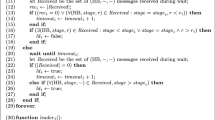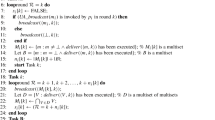Abstract
Due to the multiplicity of loci of control, a main issue distributed systems have to cope with lies in the uncertainty on the system state created by the adversaries that are asynchrony, failures, dynamicity, mobility, etc. Considering message-passing systems, this paper considers the uncertainty created by the net effect of asynchrony and process crash failures in systems where the processes are anonymous (i.e., processes have no identity and locally execute the same algorithm). Trivially, agreement problems such as consensus, that cannot be solved in non-anonymous asynchronous systems prone to process failures, cannot be solved either if the system is anonymous. The paper investigates failure detectors that allow processes to circumvent this impossibility. It has several contributions. It first presents four failure detectors (denoted AP, \({\overline{AP}}\), AΩ, and AΣ) and show that they are the “identity-free” counterparts of perfect failure detectors, eventual leader failure detectors, and quorum failure detectors, respectively. AΣ is new and showing that AΣ and Σ have the same computability power in a non-anonymous system is not trivial. The paper also shows that the notion of failure detector reduction is related to the computation model. Then, the paper presents and proves correct a uniform anonymous consensus algorithm based on the failure detector pair (AΩ, AΣ) (“uniform” means here that not only processes have no identity, but no process is aware of the total number of processes). This new algorithm is not a simple “straightforward extension” of an algorithm designed for non-anonymous systems. To benefit from AΣ, it uses a novel broadcast facility which encapsulates an AΣ-based message exchange pattern that provides the processes with an interesting intersection property on the set of messages they have exchanged. Finally, the paper discusses the notions of failure detector hierarchy, weakest failure detector for anonymous consensus, and the implementation of identity-free failure detectors in anonymous systems.
Similar content being viewed by others
References
Angluin, D.: Local and global properties in networks of processes. In: Proc. 12th Symposium on Theory of Computing (STOC’80). ACM Press, pp. 82–93 (1980)
Angluin D., Aspnes J., Diamadi Z., Fischer M.J., Peralta R.: Computation in networks of passively mobile finite-state sensors. Distrib. Comput. 18(4), 235–253 (2006)
Attiya H., Snir M., Warmuth M.K.: Computing on an anonymous ring. J. ACM. 35(4), 845–875 (1988)
Attiya, H. Welch, J.: Distributed computing, fundamentals, simulation and advanced topics, 2nd edn. Wiley Series on Parallel and Distributed Computing, p. 414 (2004)
Biely, M., Robinson, P., Schmid, U.: Weak synchrony models and failure detectors for message-passing (k) set agreement. In: Proc. 13th Int’l Conference on Principles of Distributed Systems (OPODIS’09), Springer-Verlag LNCS #5923, pp. 285–299 (2009)
Bonnet, F., Raynal, M.: The price of anonymity: optimal consensus despite asynchrony, crash and anonymity. ACM Trans. Auton. Adapt. Syst. (TAAS). 6(4):Article 23 (2011)
Bonnet F., Raynal M.: A simple proof of the necessity of the failure detector Σ to implement an atomic register in asynchronous message-passing systems. Inf. Process. Lett. 110(4), 153–157 (2010)
Bonnet, F., Raynal, M.: Anonymous asynchronous systems: the case of failure detectors. Tech Report PI 1945, IRISA, Rennes (2010)
Chandra T., Hadzilacos V., Toueg S.: The weakest failure detector for solving consensus. J. ACM. 43(4), 685–722 (1996)
Chandra T., Toueg S.: Unreliable failure detectors for reliable distributed systems. J. ACM. 43(2), 225–267 (1996)
Chothia, T., Chatzikokolakis, K.: A survey of anonymous peer-to-peer file-sharing. In: Proc. Satellite workshop of the Int’l Conference on Embedded and Ubiquitous Systems (EUS’05), pp. 744–755 (2005)
Delporte-Gallet, C., Fauconnier, H., Guerraoui, R.: A realistic look at failure detectors. In: Proc. Int’l Conference International on Dependable Systems and Networks (DSN’02). IEEE Computer Press, pp. 345–353 (2002)
Delporte-Gallet, C., Fauconnier, H., Guerraoui R.: Tight failure detectors bounds on atomic object implementations. J. ACM. 57(4) (2010). http://dx.doi.org/10.1145/1734213.1734216
Delporte-Gallet, C., Fauconnier, H., Guerraoui, R., Hadzilacos, V., Kouznetsov, P., Toueg, S.: The weakest failure detectors to solve certain fundamental problems in distributed computing. In: Proc. 23th ACM Symposium on Principles of Distributed Computing (PODC’04) ACM Press, pp. 338–346 (2004)
Delporte-Gallet, C., Fauconnier, H., Guerraoui, R., Tielmann, A.: The weakest failure detector for message passing set-agreement. In: Proc. 22th Int’l Symposium on Distributed Computing (DISC’08), Springer-Verlag LNCS #5218, pp. 109–120 (2008)
Durresi, A., Paruchuri, V., Durresi, M., Barolli, L.: A hierarchical anonymous communication protocol for sensor networks. In: Proc. Int’l Conference on Embedded and Ubiquitous Systems (EUS’05), Springer Verlag LNCS #3824, pp. 1123–1132 (2005)
Fischer M.J., Lynch N.A., Paterson M.S.: Impossibility of distributed consensus with one faulty process. J. ACM. 32(2), 374–382 (1985)
Gifford, D.K.: Weighted voting for replicated data. In: Proc. 7th ACM Symposium on Operating System Principles (SOSP’79), ACM Press, pp. 150–172 (1979)
Guerraoui R., Raynal M.: The alpha of indulgent consensus. Comput. J. 50(1), 53–67 (2007)
Jayanti, P., Toueg, S.: Every problem has a weakest failure detector. In: Proc. 27th ACM Symposium on Principles of Distributed Computing (PODC’08), pp. 75–84 (2008)
Lakshman T.V., Wei V.K.: Distributed computing on regular networks with anonymous nodes. IEEE Trans. Comput. 43(2), 211–218 (1994)
Lynch, N.A.: Distributed Algorithms. Morgan Kaufmann Pub., San Francisco, CA, p. 872 (1996)
Mostefaoui A., Rajsbaum S., Raynal M., Travers C.: On the computability power and the robustness of set agreement-oriented failure detector classes. Distrib. Comput. 21(3), 201–222 (2008)
Mostefaoui, A., Rajsbaum, S., Raynal, M., Travers, C.: The combined power of conditions and information on failures to solve asynchronous set agreement. SIAM J. Comput. 38(4), 1574–1601 (2008). http://dx.doi.org/10.1137/050645580
Mostefaoui, A., Raynal, M.: Solving consensus using Chandra–Toueg’s unreliable failure detectors: a general quorum-based approach. In: Proc. 13th Int’l Symposium on Distributed Computing (DISC’99), Springer-Verlag LNCS #1693, pp. 49–63 (1999)
Mostefaoui A., Raynal M.: Leader-based consensus. Parallel Process. Lett. 11(1), 95–107 (2001)
Raynal, M.: Communication and Agreement Abstractions for Fault-Tolerant Asynchronous Distributed Systems. Morgan & Claypool Publishers, San Francisco, CA, p. 251, ISBN 978-1-60845-293-4 (2010)
Yamashita M., Kameda T.: Computing on anonymous networks: part I-characterizing the solvable cases. IEEE Trans. Parallel Distrib. Syst. 7(1), 69–89 (1996)
Yamashita M., Kameda T.: Computing on anonymous networks: part II-decision and membership problems. IEEE Trans. Parallel Distrib. Syst. 7(1), 90–96 (1996)
Author information
Authors and Affiliations
Corresponding author
Rights and permissions
About this article
Cite this article
Bonnet, F., Raynal, M. Anonymous asynchronous systems: the case of failure detectors. Distrib. Comput. 26, 141–158 (2013). https://doi.org/10.1007/s00446-012-0169-5
Received:
Accepted:
Published:
Issue Date:
DOI: https://doi.org/10.1007/s00446-012-0169-5




